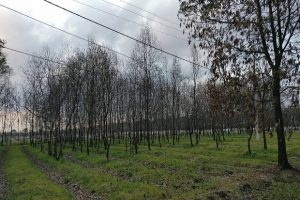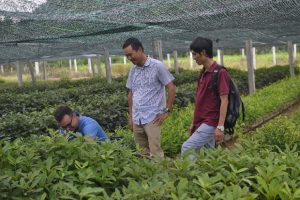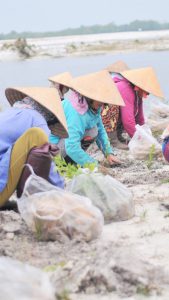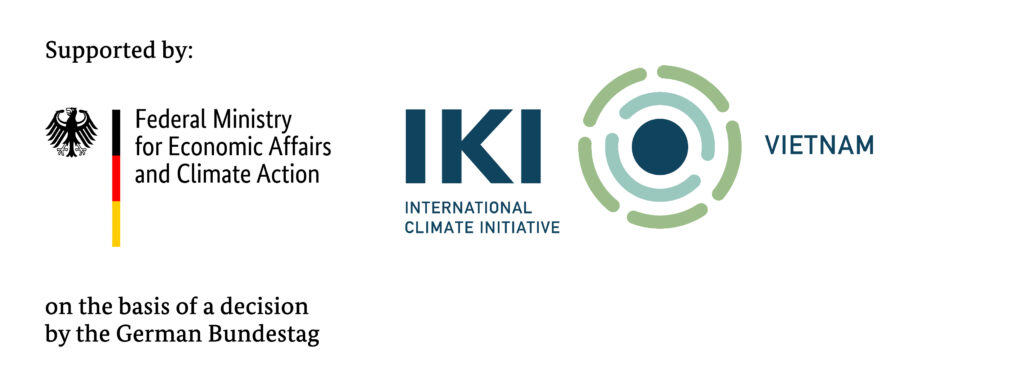According to the 2019 Global Climate Change Index, Vietnam is among the countries most affected by climate change. Many typhoons make landfall on the North-Central Coast of Vietnam (NCC-VN). Due to climate change, experts expect that the impacts of typhoons are likely to increase. Natural coastal forests on dunes and mangroves along estuaries constitute natural protection for communities against extreme weather events. However, due to massive overuse, most of these highly diverse forests are severely degraded or have vanished entirely. As a consequence, the protective functions of the coastal forests are impaired, leaving rural populations exposed to the impacts of tropical storms.
Recovery without assisted regeneration is often not possible, because sandy areas are extremely difficult sites (very poor soils, temperatures exceeding 60° C, drought and water stress) and seed trees are no longer prevalent. Recent reforestation efforts focus on non-native tree species such as Acacia crassicarpa and Casurina crassicarpa, which often cannot cope with the extreme conditions (see picture below).
 UNIQUE forestry and land use GmbH and the Institute of Resources and Environment (IREN) at Hue University are jointly implementing the IKI-project “Ecosystem-based Adaptation in the North Central Coast of Vietnam: Restoration and Co-management of Degraded Dunes and Mangroves” between April 2018 and March 2022. The main project goal is to demonstrate the feasibility of a nature-based solution for restoring and improving the protective functions of degraded sandy sites and estuaries, and to promote upscaling of effective solutions in order increase the resilience of local communities to climate change.
UNIQUE forestry and land use GmbH and the Institute of Resources and Environment (IREN) at Hue University are jointly implementing the IKI-project “Ecosystem-based Adaptation in the North Central Coast of Vietnam: Restoration and Co-management of Degraded Dunes and Mangroves” between April 2018 and March 2022. The main project goal is to demonstrate the feasibility of a nature-based solution for restoring and improving the protective functions of degraded sandy sites and estuaries, and to promote upscaling of effective solutions in order increase the resilience of local communities to climate change.
During the last decade, Hue University has carried out excellent research on dunes and estuaries. In the few original, highly diverse coastal forests that remain, researchers identified more than 190 native and endemic tree species that can cope with extreme site conditions. The IKI project translates this wealth of knowledge into practice in three provinces in the agro-ecological zone NCC-VN: Thua Thien Hue, Quang Tri, and Quang Binh. Co-managed by local communities, a total of 500 ha of restored areas will serve as a blueprint for scaling up to the landscape level; for example, as part of respective international and domestic programs targeting adaptation to climate change (e.g. Coastal Forest Protection and Development Program 120 to respond to climate change in 2015-20).
 During the first phase, the project identified suitable pilot areas and partner and communities. After close consultation with responsible authorities the project received approval in the three pilot provinces and agreements were made with the communities on implementation and management of the protection forest areas. In parallel, four nurseries were established, in which more than 580,000 seedlings of 12 native tree species were raised successfully – among them critically endangered species, such as Shorea falcata.
During the first phase, the project identified suitable pilot areas and partner and communities. After close consultation with responsible authorities the project received approval in the three pilot provinces and agreements were made with the communities on implementation and management of the protection forest areas. In parallel, four nurseries were established, in which more than 580,000 seedlings of 12 native tree species were raised successfully – among them critically endangered species, such as Shorea falcata.
During the preparation phase, the team focused on the collection of seedlings from suitable mother trees, and the critical germination and other preparations for planting. Further activities included planting and monitoring design, a biodiversity baseline study, a study on business models for non-timber forest products in the restored areas, training courses for the communities and the supervision teams, and logistics for organic fertilizer, rice straw, and seedlings.

In October 2019, the sites and seedlings were finally ready for the first planting phase, and the first 300 ha were planted successfully by December 2019. So far, survival rates have been excellent (> 90%); the monitoring will reveal potential needs for replanting during the planting season in 2020, when the remaining 200 ha will be planted, including 50 ha of mangroves). The team learned many important lessons, which will be taken into account during planting of the remaining project areas in 2020 and disseminated to other relevant programs, such as the World Bank Forest Modernisation and Coastal Reforestation Program (FMCR).
Also in October 2019, the project team facilitated progress workshops in all three project provinces to inform relevant authorities and stakeholders about progress and the next steps. During these events, the project received very positive feedback on its approach and progress, in particular regarding species selection and the development of business models for non-timber forest products, such as the production of essential oils from leaves of Melaleuca cajuputi powell. The IREN and UNIQUE project teams will continue to disseminate and promote this innovative nature-based solution to climate change impacts.
